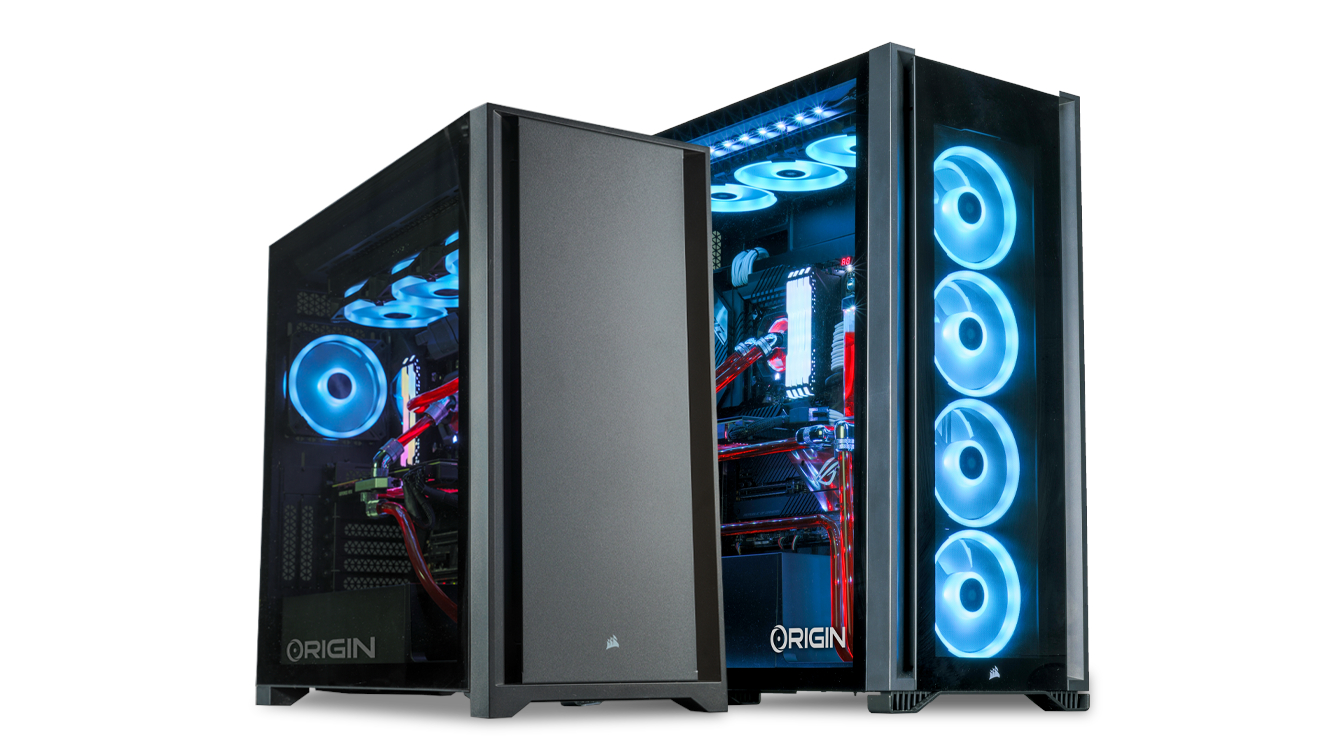Get a tailor-made desktop computer with Origin PC. Most people just head to their nearest big-box retailer when they want to buy a new PC. It’s the safe option and there are certainly some great pre-made choices out there, but it’s not necessarily the best way to buy a computer.
If you do a bit of research then you’ll come across companies like Origin PC – bespoke system builders who create PCs that are faster, better-made, and often cheaper than the stuff you’ll find at the big names like Dell or HP. If you’re looking for one of the best home computers, but you want more control over the specs and design of your machine, the Origin PC offers some of the best home computers out there.
Buying from a company like Origin PC can deliver faster, sleeker and more capable computing, but we’ve examined Origin’s range to find out where this company excels – and where it doesn’t quite match up.
Origin PC review: Design
- Corsair cases
- Various form factors and design options
- LEDs, water cooling, capture cards etc.
One of the best things about buying from a system builder is the variety of options you’ve got when it comes to PC design. Origin’s range of workstation systems is impressive, with loads of options to suit every budget and task.
The firm’s M-Class workstations are mid-tower systems that provide solid mainstream performance at reasonable prices – and, indeed, they start at $1,251. While the price means you don’t get the bold design found on high-end rigs, there’s still plenty to like. Origin uses Corsair 4000-series cases on M-Class machines, which means you get great cooling, tempered glass, and cable-management.
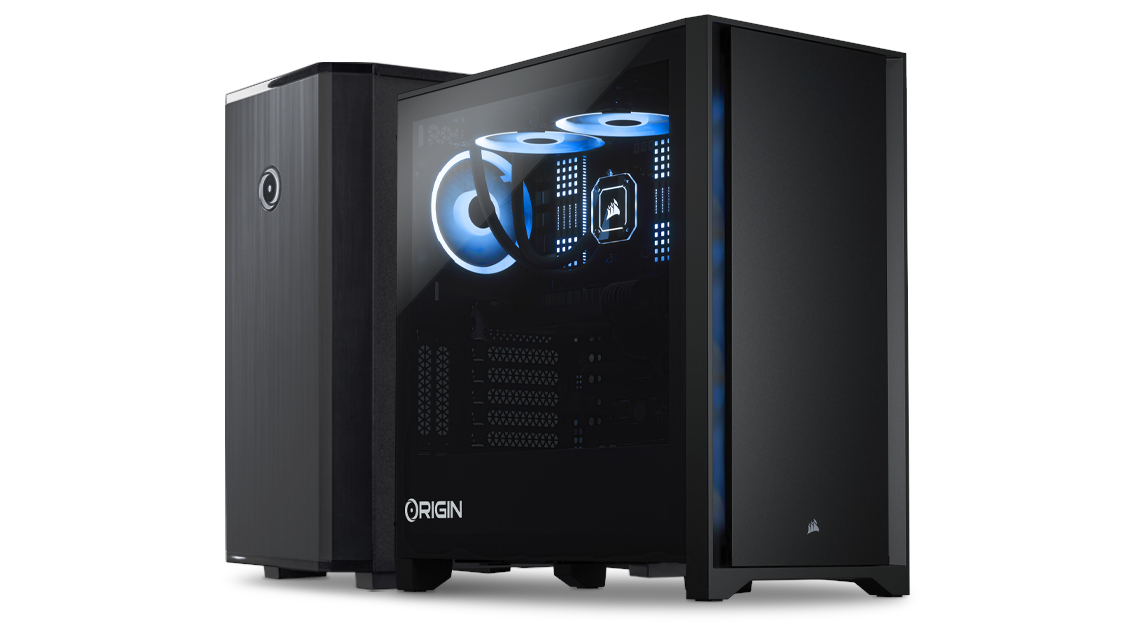
Another more affordable option is the S-Class range. These machines start at $1,302 and use an exclusive Origin PC small form-factor case, so they’re worth investigating if you need a smaller case.
The modest case makes the S-Class easier to fit inside snug spaces. These machines still include powerful hardware, but the compact design means compromise: they have smaller motherboards and less upgrade room.
The S-Class also has a sister system called the Cam Link Pro. This PC starts at $1,471 and shares the same small form factor case, but also adds Elgato capture cards that can be used to conduct broadcasts, conferences, or streams easily.
Go beyond these machines and you’ll stumble across Origin PC’s L-Class PCs. These are significantly more expensive, with prices that start at $2,320. They’re full-tower systems with enthusiast-level components, and that means different design demands: the L-Class rigs use enclosures with sleek looks, incredible airflow and top-notch connectivity, and on the inside you’ll find liquid cooling as standard.
Origin PC doesn’t just build workstation desktops – the company has a broad range of gaming systems, too.
The most affordable system is the Millennium, which starts at $2,235 and uses Corsair 5000-series cases that are similar to the 4000-series hardware deployed in M-Class workstations. The $2,400 Neuron machines use Corsair cases and liquid coolers, too. And then there’s the smaller Chronos, which starts at $2,604 and uses the same Origin PC chassis as the S-Class desktop.
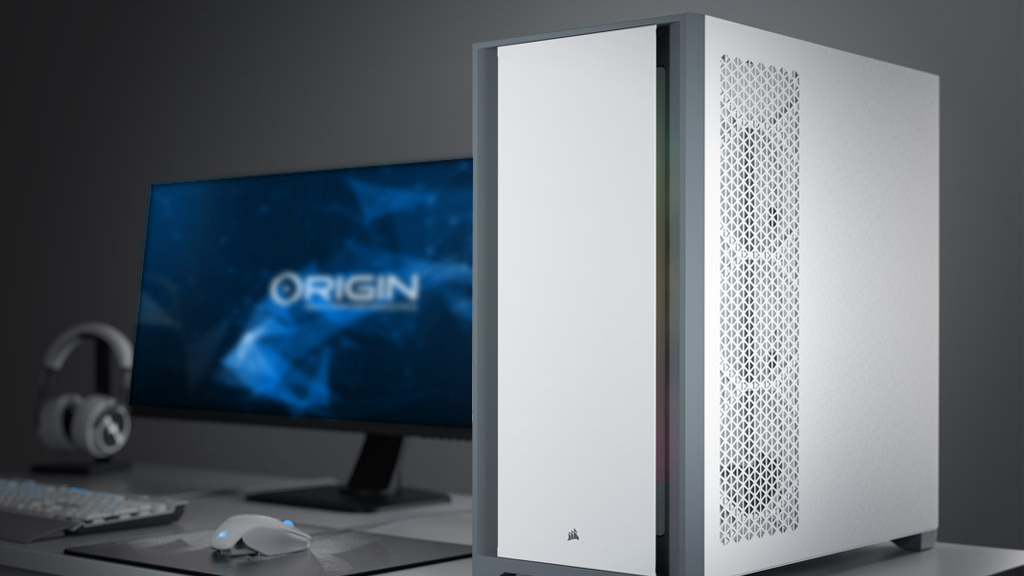
Origin PC’s workstations and gaming PCs are well-designed, but the beauty of coming to a company like this is the ability to customize your system.
On the design front, that means the ability to change your case, cooling, and color options. Suppose you want to buy one of Origin’s workstations. In that case, you can choose different cases, pick from a wide selection of liquid and air-cooling options, and even customize the glass side panels with glass printing – perfect for a company logo.
There are more extensive design tweaks on the gaming side. Even on the entry-level Millennium you can choose from glass printing, interior lighting, and laser etching, and on a pricier PC like the Neuron you can opt for more extensive colour options on the case. It’s even possible to deploy extensive water-cooling setups, synchronized lighting and custom case-wrapping if you’re willing to stump up the cash.
There’s an awful lot to like about Origin PC’s design options, but the selection isn’t flawless. The company uses extensive Corsair hardware, but a wider selection of kit from different companies would certainly provide more variety.
There could be a broader selection of affordable options, too: Origin PC isn’t the priciest company around, but its core PCs always cost more than $1,000. If you want to buy an everyday for browsing the web and answering emails, then Origin PC’s range is overkill.
Origin PC review: Specs
- Hugely customizable
- Plenty of high-end spec options
If you’re a gamer, then you’re in luck: Origin’s range starts with machines that are suitable for mainstream titles and tops out with systems that can tackle the toughest 4K and ultrawide games. If you need a work system, Origin’s systems can handle mainstream content-creation situations right up to the toughest 4K video, CAD and design tasks.
These systems are overkill for anyone who needs a PC for entry-level tasks, like browsing the web and answering emails, and esports fans will easily be sated by cheaper gaming PCs.
Origin’s specifications are designed to be built from the ground up to suit each buyer, and that means you’ve got loads of choice. Most of the core components on offer are available across Origin’s workstations and gaming systems.
You’re able to choose from Intel and AMD processors. On the Intel side of things, chips range from the Core i5-11400 and i5-11600K to the high-end Core i9 Extreme series, and the firm’s popular Core i7 processors sit in the middle. If you’d prefer AMD, you can choose from the Ryzen 5 5600X, the Ryzen 7 5800X and then some beefier Ryzen 9 chips.
There are no bad choices here – but some CPUS are better than others. If you’re into mainstream gaming, the Intel Core i5 and AMD Ryzen 5 chips are excellent but stick with AMD if you’d like to tackle some content-creation, too. If you want to run high-end games, then Intel’s Core i7 chips are your best bet. For really challenging creative tasks or anything that demands multi-core speed stick with AMD – those Ryzen 7 and Ryzen 9 chips are superior to Intel.
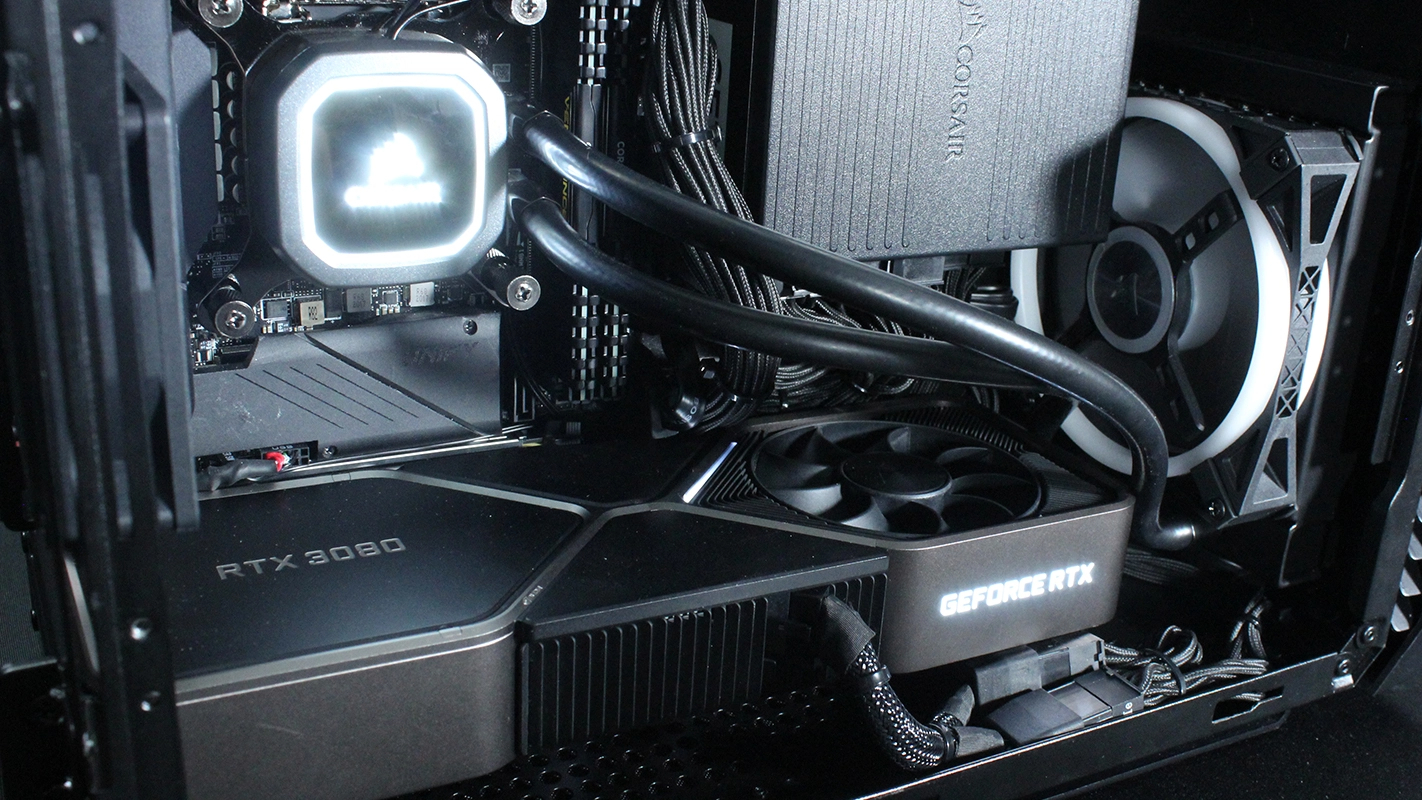
Origin has a reasonable selection of motherboards for Intel and AMD processors, with mid-range and high-end boards available from major companies like Asus, MSI and ASRock. Memory can be configured in capacities from 16GB of 128GB, and SSDs are available from Corsair and Samsung.
On the graphics front, Origin stocks many current-generation cards from AMD and Nvidia. On the Nvidia side you can choose from the RTX 3060 for 1080p gaming and esports or the RTX 3070 or RTX 3070 Ti for 1440p gaming. High-end cards like the RTX 3080, RTX 3080 Ti or RTX 3090 are well-suited to running 4K displays, widescreen panels and VR headsets.
Origin also sells a variant of its L-Class workstation with Nvidia Studio certification. That means the rig uses special drivers that are optimized for creative apps – so you get better performance in software like Autodesk, Blender, and Adobe’s Creative Suite. If you’re a content creator or professional who wants every bit of performance possible, that’s what you need.
On the AMD side, you can pick from the Radeon RX 6700 XT, RX 6800 and RX 6800 XT. They’re good GPUs for mainstream gaming and esports, but the RX 6900 XT is currently absent from Origin’s website and means that AMD misses a proper 4K option.
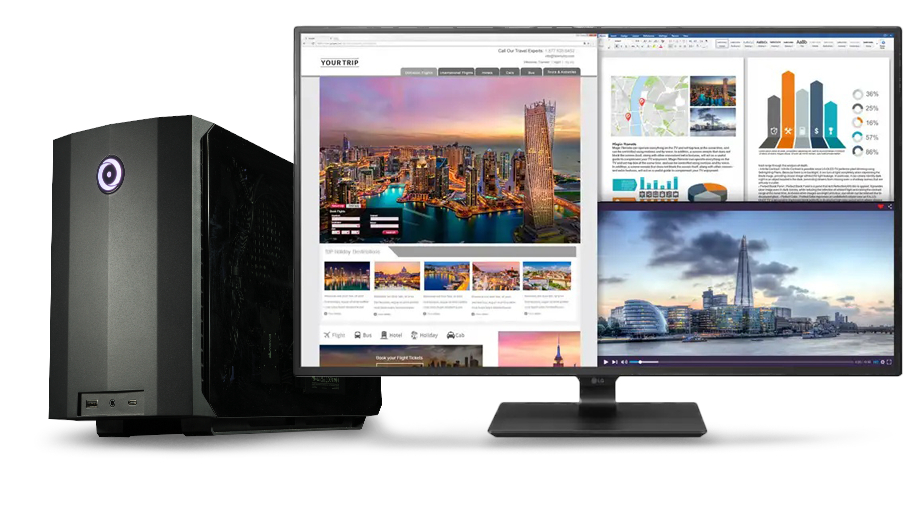
It’s a very good selection of components, and it should sate anyone who needs to build a high-end rig for gaming or tough workloads – but it’s not perfect.
If you want a more affordable system with an Intel Core i3 or AMD Ryzen 3 processor, for instance, then you’re out of luck – Origin doesn’t stock these components. Similarly, you won’t find entry-level motherboards or graphics cards. Only some of Origin’s PCs allow you to deviate from the standard 3200MHz memory speed, and that would have been a welcome on all rigs.
These tiny quibbles do come with caveats. Companies like Origin specialize in customizing their computers, and so it’s worth talking to them before purchasing – if their website doesn’t list a particular component, it may still be possible to get it included after a quick chat.
Also bear in mind that we’re living in a time of extreme component shortages and unpredictable supply chains, and so something that’s unavailable at the moment might arrive soon.
Origin PC review: What about laptops?
- Gaming and work laptops
- Cutting edge hardware
Origin doesn’t just produce PCs – the firm sells laptops, too. As with its desktops, the selection is split between gaming and workstation devices.
Origin’s gaming notebooks are split between slim, light models and desktop replacement machines. Machines in the former category are available in 15” and 17” models and with current-generation Nvidia graphics chips and 300Hz displays – perfect for top-notch mainstream and esports gaming. The desktop replacement machines are only available in 17” guises, and they have more powerful Core i9 processors alongside 4K screens. They’re better for high-end single-player gaming.
Origin’s workstation laptops are divided into 15” and 17” models. They’ve got a broader selection of processors, including Intel 11th gen chips, and they can be configured with high-end graphics cards, workstation GPUs and 4K displays.
All of these laptops can be fully customized, just like Origin’s desktops. And if you’d like more information about laptops, head to our best laptops guide.
Origin PC review: User Reviews
- Almost all positive reviews
- Good customer service too
Origin PC’s website has testimonials from happy customers. Plenty of people have plenty of praise for Origin’s PCs: the systems are well-built, powerful, and extremely capable.
Customers don’t just like the PCs themselves. While several buyers have reported problems with their PCs, they’ve been happy with how the issues have been resolved. Some people praised how friendly Origin PC’s staff were, and others were impressed by the robust wooden crates the firm uses for shipping.
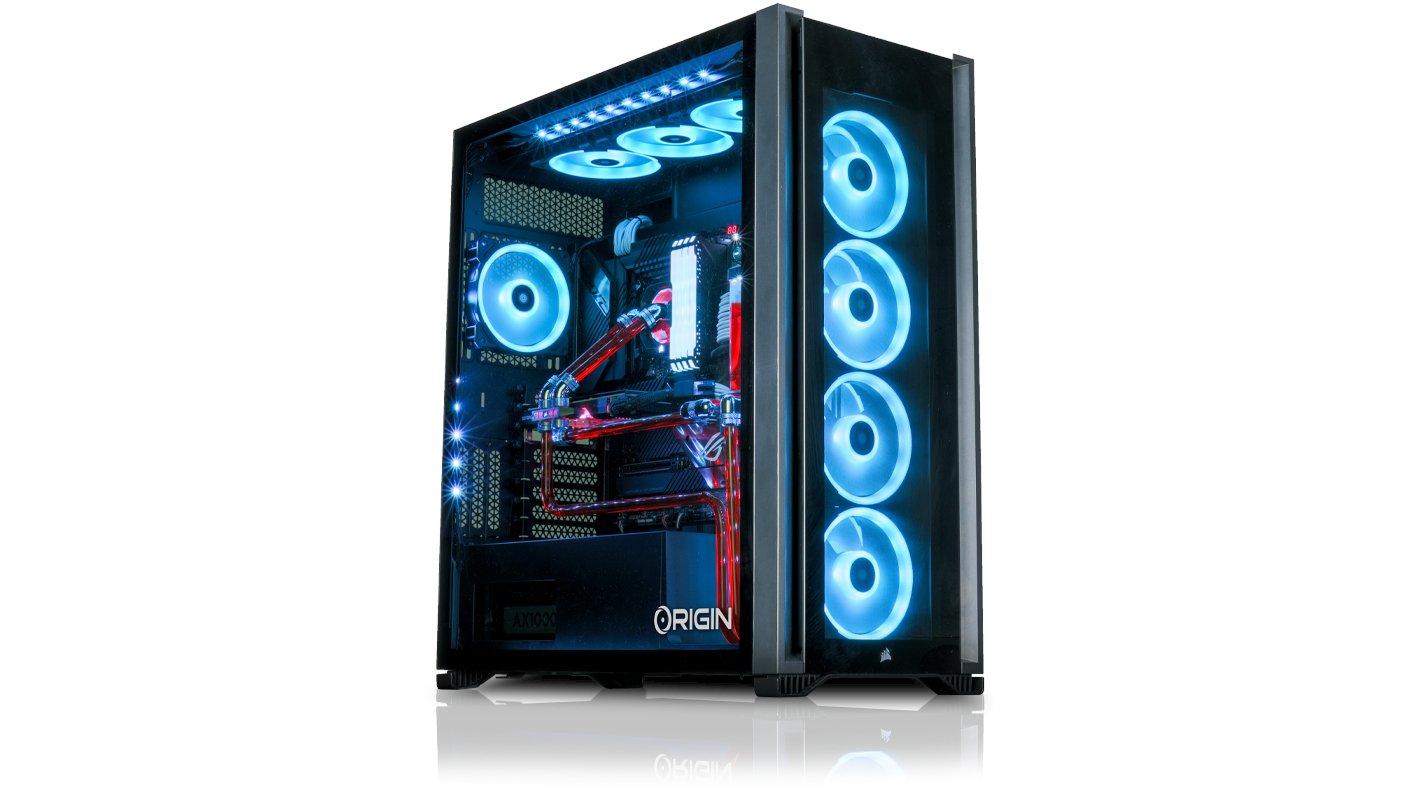
Origin PC review: Customer Service
- One year warranty (can be upgraded to two or three year)
- Personal customer support
Origin PC’s default warranty is a one-year parts deal with 45 days of shipping included. It’s a reasonable deal, and the inclusion of lifetime 24/7 support and labour is a huge gain, but other companies offer more parts protection.
Upgrades are available, with two- and three-year warranties on offer for prices that range between $70 and $250.
Because Origin PC is a smaller company, the firm doesn’t have the online portals and knowledge bases that you’ll find if you buy a PC from a firm like Dell or HP. But that’s not a bad thing: because Origin PC build bespoke machines you get bespoke support, too. You’ll always have someone to talk to if something goes wrong, and you’ll get personal service.
Should you buy an Origin PC?
There’s plenty to recommend about Origin PC. The company has loads of expertise, and its smaller stature means you get more of a personal service than you will from a big-brand retailer – so you can get the PC you need and looked after if anything goes wrong.
Beyond the good service, Origin PC offers specifications that sate gamers and productivity users. The firm’s PCs cover everything from mainstream gaming and work tasks to the extreme high-end rigs required by demanding customers. Customization options reward people who have more tech knowledge, or those who are willing to do their research.
If you want a high-quality build with powerful components, then Origin PC is a top choice. That said, if you need an entry-level rig then these PCs are too powerful and pricey, and it may not be worth venturing into this kind of system if you’re not too tech-savvy. If you want something a bit less powerful, and a bit less complicated to spec up then check out our Dell Inspiron desktop review.
Which Origin PC spec should you choose?
If you’re considering an Origin PC, then choosing the specification is going to be a very personal thing – you’ll have to pick a rig that suits your needs and workflow. Happily, there are some rules that you should always follow.
If you want to play games, then stick with an Intel processor. And then look at graphics cards: you’ll be fine with an Nvidia GeForce RTX 3060 or AMD Radeon RX 6700 XT for 1080p gaming, you’ll want a mid-range RTX 3070 or RX 6800 XT for 1440p titles, and you’ll have to deploy the top-end chips to handle 4K tasks.
If you want to tackle workloads – whether it’s content-creation, design, or high-end multi-tasking – then you’re better off with an AMD Ryzen processor.
Beyond those broad rules, do your research, pick the features and components you need, and open the lines of communication with Origin PC – they’re knowledgeable, friendly, and ready to offer advice.
